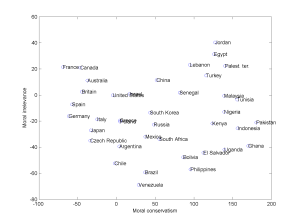 Oren Cass has an article in Foreign Affairs about the problem of climate catastrophizing. It is basically how it becomes driven by motivated reasoning but also drives motivated reasoning in a vicious circle. Regardless of whether he himself has motivated reasoning too, I think the text is relevant beyond the climate domain.
Oren Cass has an article in Foreign Affairs about the problem of climate catastrophizing. It is basically how it becomes driven by motivated reasoning but also drives motivated reasoning in a vicious circle. Regardless of whether he himself has motivated reasoning too, I think the text is relevant beyond the climate domain.
Some of FHI research and reports are mentioned in passing. Their role is mainly in showing that there could be very bright futures or other existential risks, which undercuts the climate catastrophists that he is really criticising:
Several factors may help to explain why catastrophists sometimes view extreme climate change as more likely than other worst cases. Catastrophists confuse expected and extreme forecasts and thus view climate catastrophe as something we know will happen. But while the expected scenarios of manageable climate change derive from an accumulation of scientific evidence, the extreme ones do not. Catastrophists likewise interpret the present-day effects of climate change as the onset of their worst fears, but those effects are no more proof of existential catastrophes to come than is the 2015 Ebola epidemic a sign of a future civilization-destroying pandemic, or Siri of a coming Singularity
I think this is an important point for the existential risk community to be aware of. We are mostly interested in existential risks and global catastrophes that look possible but could be impossible (or avoided), rather than trying to predict risks that are going to happen. We deal in extreme cases that are intrinsically uncertain, and leave the more certain things to others (unless maybe they happen to be very under-researched). Siri gives us some singularity-evidence, but we think it is weak evidence, not proof (a hypothetical AI catastrophist would instead say “so, it begins”).
Confirmation bias is easy to fall for. If you are looking for signs of your favourite disaster emerging you will see them, and presumably loudly point at them in order to forestall the disaster. That suggests extra value in checking what might not be xrisks and shouldn’t be emphasised too much.
Catastrophizing is not very effective
The nuclear disarmament movement also used a lot of catastrophizing, with plenty of archetypal cartoons showing Earth blowing up as a result of nuclear war or commonly claiming it would end humanity. The fact that the likely outcome merely would be mega- or gigadeath and untold suffering was apparently not regarded as rhetorically punchy enough. Ironically, Threads, The Day After or the Charlottesville scenario in Effects of Nuclear War may have been far more effective in driving home the horror and undesirability of nuclear war better, largely by giving a smaller-scale more relateable scenarios. Scope insensitivity, psychic numbing, compassion fade and related effects make catastrophizing a weak, perhaps even counterproductive, tool.
Defending bad ideas
Another take-home message: when arguing for the importance of xrisk we should make sure we do not end up in the stupid loop he describes. If something is the most important thing ever, we better argue for it well and backed up with as much evidence and reason as can possibly be mustered. Turning it all into a game of overcoming cognitive bias through marketing or attributing psychological explanations to opposing views is risky.
The catastrophizing problem for very important risks is related to Janet Radcliffe-Richards’ analysis of what is wrong with political correctness (in an extended sense). A community argues for some high-minded ideal X using some arguments or facts Y. Someone points out a problem with Y. The rational response would be to drop Y and replace it with better arguments or facts Z (or, if it is really bad, drop X). The typical human response is to (implicitly or explicitly) assume that since Y is used to argue for X, then criticising Y is intended to reduce support for X. Since X is good (or at least of central tribal importance) the critic must be evil or at least a tribal enemy – get him! This way bad arguments or unlikely scenarios get embedded in a discourse.
Standard groupthink where people with doubts figure out that they better keep their heads down if they want to remain in the group strengthens the effect, and makes criticism even less common (and hence more salient and out-groupish when it happens).
Reasons to be cheerful?
An interesting detail about the opening: the GCR/Xrisk community seems to be way more optimistic than the climate community as described. I mentioned Warren Ellis little novel Normal earlier on this blog, which is about a mental asylum for futurists affected by looking into the abyss. I suspect he was maybe modelling them on the moody climate people but adding an overlay of other futurist ideas/tropes for the story.
Assuming climate people really are that moody.








